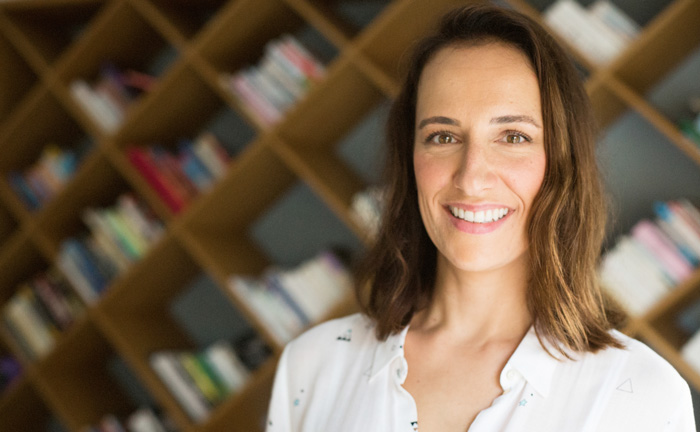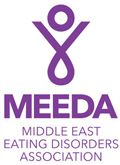Written with Hadley Orway
Since you are here, you are taking important steps to recover (or have recovered) from chronic dieting, hypothalamic amenorrhea, disordered eating or perfectionism towards your body image. Well done! You’re challenging your food and health beliefs, giving yourself permission to eat all the foods, committing to exercise less, and to nurture your body back to true health (aka the one that can be maintained without killing yourself with rules).
During or after recovery, you may be experiencing breakouts and acne symptoms. Usually, it is just a temporary symptom that eases off as you recover, so the first and best thing you can do if acne shows up during recovery, is to keep working on giving yourself permission to eat, gain weight and truly feel free around food, while investing in a good skincare (more on this below!). Remember, this too shall pass…
Nevertheless, living with acne is definitely not an easy situation to manage, especially if you’re well past the teenager stage. (More about skin stigma here) A lot of the information out there suggests cutting foods out of your diet, but research shows that it is ineffective at best, or downright harmful (especially if you struggled with chronic dieting or disordered eating to start with), as it can be a slippery slope to fall back into more restriction, which can disrupt your delicate hormonal balance even more. Whether it is for weight loss or acne, our biology fights restriction/dieting by rebalancing hormones in order to counter the effects of what is recorded as ‘starvation’. In the case of acne, the rise in cortisol induced by dieting is even more counterproductive, and would not produce the long-term effects you wish for. You could also be more at risk of an eating disorder, which develops for 35% of dieters and is noticeably more complicated to treat.
If food restriction is not an option, what can you do if you experience breakouts? There are plenty of things you could try. Here are a few for you to implement in your everyday life! Feel free to let me know how it is going for you.
1/ Instead of taking out foods, add some in!
Remember that restriction got you into feeling crazy around food, experiencing hormonal imbalances or even losing your period in the first place.
Be mindful of eating regularly, and enough, of all food groups (unless you have a proven allergy, of course) as well as to aim to balance sugars with fat and protein so you reduce the effects of insulin spikes (which can also increase cortisol and perpetuate acne).
Look into supporting your gut health with pre- and probiotics. You can find them in tablets (the most efficient ones are usually stored in the pharmacist’s fridge) or add in Kefir, Sauerkraut, Kimchi, Kombucha, etc to your daily food intake.
You could also experiment with supplements (one at a time) that are proven to support skin health, like Zinc or Fish oil and see how things go (over a month at least).
If you are currently recovering in order to conceive short or midterm, it would be best to stay off of medications and keep only topical products (skincare) to support your acne management. Be mindful of medications proposed by your doctor, especially if they require you to go back on birth control because they can lead to birth defects (Accutane) or if they are considered a ‘quick fix’ that can make things worse overtime (like antibiotics).
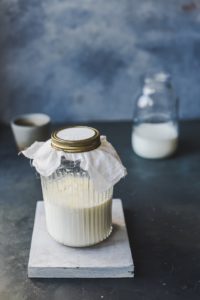
2/ Invest in good acne products and stick to a simple routine. Don’t expect quick fixes.
Remember that treating skin issues can take time, so jumping from one skincare routine to another or mixing up powerful ingredients can be detrimental.
Over-the-counter products: traditional acne products typically contain either Salicylic Acid or Benzoyl Peroxide. Both of these are safe in recovery, as they don’t disrupt your hormones and affect only the local area where acne is present. Try some of these and see what works best for you. Some people are more receptive to Benzoyl Peroxide but others swear by Salicylic acid products. Resist the urge to use more than 3 products on your face (interaction between these products can be counter-productive), and give it some time to be truly efficient, acne CANNOT resolve in a day or even a couple of weeks. Avoid harsh scrubs and masks, as they can exacerbate inflammation. Be really soft and kind with your skin.
Traditional products we used and loved:
- Rodan and Fields UnBlemish set of cleanser, toner, acne treatment and moisturizer.
- La Roche Posay Effaclar range of cleanser, acne treatment and moisturizer.
You could also visit your dermatologist and ask for a recommendation, mentioning you don’t wish to go through any food elimination process and asking about side effects of oral medication pills if these are suggested, especially if you plan to conceive a baby over the coming months.
Natural products: washing your face with oil and then putting rosehip oil. Essential oils can be used and are safe when applied topically. For acne we suggest you try hempseed, rosehip, jojoba, tea tree (needs to be used with a carrier oil like jojoba, do not apply near eyes, try on a small area first as it can cause itching), and castor oil (rosehip and castor are particularly good for acne scars). They are also great replacements for facial moisturizers which can cause breakouts. You can also try this Vitamin C serum.
Aloe is great when you do have a breakout as it cleans the area, soothes it and reduces redness. Take a cotton ball with aloe and put it on the blemish or the area. You can also use homeopathic arnica gel, that will reduce swelling and redness.
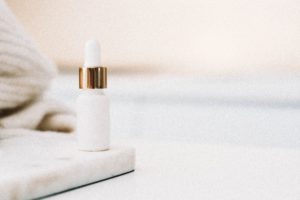
3/ Refrain from skin picking
When feeling the urge to pick at your skin, distract yourself: step away from the mirror, put a face mask on, dance or put on music, go for a walk or call someone you love. Nothing good ever came out of picking your spots. Trust us on this one.
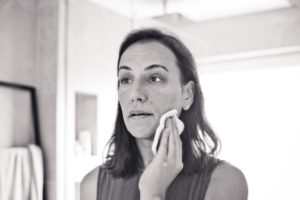
4/ Change your mindset
- Reduce stress and practice self-compassion. Work on stress levels and coping skills when anxiety hits you. Make a practice of banning negative words like ‘bad’, ‘disgusting’, ‘horrifying’, ‘gross’ when talking about your skin. Remember to be as positive or non-judgmental as possible, and to focus on substance rather than appearance: think of your courage, kindness, ambition, compassion. If you feel in physical pain from painful spots, journal about it and what emotions it brings up for you. Address those difficult emotions through extra self-care: meditation, walks, yoga, deep breathing, listening to music, speaking to a friend, holding a gratitude journal. Seek medical support if you suffer from social anxiety, stress, depression related to acne. Find relief in knowing that working on your mental health is likely to also have a positive impact on your skin in the long run.
- Stop skin shamers in their tracks: Next time a stranger (or your auntie Martha) tells you about ‘cutting out dairy’ or ‘simply washing your face’ (insert eyeroll here), feel free to respond with a firm ‘Thanks for your concern. My skin is solely my business and I’d rather we speak about something more interesting together’ and redirect the conversation to a different subject.
- Curate your media: Rather than changing ourselves to fit (narrow, unrealistic) beauty standards, we can change the culture around us to accept all of us JUST AS WE ARE. Changing the culture starts with curating your (social) media feed to spark joy instead of feeling “less than”. Unfollow accounts that don’t serve you or profit from your insecurities and, instead, find your skin positive tribe to remember you are not alone in your struggles and that perfect skin SIMPLY DOES NOT EXIST IN REAL LIFE. Look for acne positive inspirations here.
- Don’t hide: It can be tempting not to attend a work event when you are embarrassed by your skin condition, or to shy away from photos when suffering from a flare-up. Resist it as best you can. Remember that your skin says NOTHING about your ability, your skills or your moral values. Keep in mind that people who love you want to spend time with you and have memories to cherish in pictures long after you’re gone. Whether you were spotty or not really doesn’t make any difference.
5/ Find support in makeup (if you feel like it can help you get through this phase)
Makeup can be really helpful to gain more confidence or show up for life events, while dealing with acne in recovery. Ignore people saying makeup makes acne worse, especially if acne is hormonal (which it most likely is in HA /disordered eating recovery ), you can rest assured make up won’t change it for better or worse. Having said that, we’d recommend you try and test any new product to assess if they make you feel comfortable and don’t create more breakouts. It is also important to remove makeup before going to bed. We like removing it with coconut or jojoba oil on a dry face, followed by a cleanser of your choice, avoiding too much rubbing (which can make your skin more sensitive), simply patting the skin with cleanser.
Requesting makeup samples to try before investing in the full size products is also a great idea. Retail stores will gladly give you mini doses to try at home, or offer to do your makeup in store, which can be fun and save you serious money to avoid buying and then having to ditch products you don’t tolerate well.
Products that have been really life changing to cover up our breakouts are:
- Benefit Pore-fessional primer (USD 32): it absorbs extra sebum and creates a clean slate for make up to be applied on top, which holds for longer periods of time. Not tinted. PS from Florence: I also find it helps me deal with having to wear (greasy) sunscreen as a base, considering I live in the desert.
- Laura Mercier Secret Camouflage (USD 36): two tones to efficiently conceal breakouts, redness and scars, without looking cakey.
- Estee Lauder Double Wear Foundation (USD 43): Use it pure if you need more coverage, or mix it with moisturizer for a lighter coverage (close to a tinted moisturizer effect). Plus there are a ton of shades to pick from to find the perfect one for every skin colour.
- Laura Mercier Translucent Loose Setting Powder (USD 39): To set the concealer and foundation and mattify the face for the whole day.
Feel free to share your best acne tips below if you have more!

